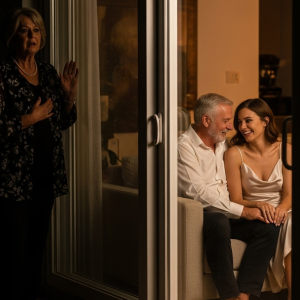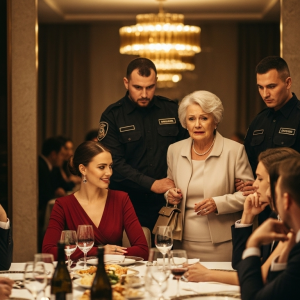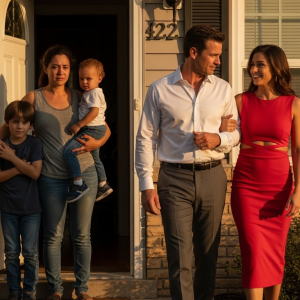My husband’s family barbecue. My husband’s sister made a joke.
“If you disappeared tomorrow,” she said with a smirk, “no one would even notice.”
Everyone laughed, except for me. I just raised my hot dog, met her eyes across the picnic table, and said, “Challenge accepted.”
I moved out that night, cut all contact, and vanished. A year later, we’ll see who’s forgotten now.
I’m Vanessa, 34, and despite seven years of marriage to Gregory, I’ve always been an outsider in his family. Last summer, at their annual barbecue, I hoped things would finally be different. Gregory’s sister, Amanda, had other plans. While I was trying to share some news about my graphic design work, she interrupted. The table erupted in laughter. Even Gregory.
That night, my challenge began.
Gregory and I met during our final year at university. I was studying graphic design while working part-time at a coffee shop to pay tuition. He was completing his business degree, fully funded by his parents. Our romance was a whirlwind. By graduation, he proposed with a ring that cost more than my entire student debt. I was swept away by his charm and what I perceived as genuine love.
When we married, I thought I was entering not just a partnership, but a new family. The Caldwells were everything my family wasn’t: affluent, well-connected, and tight-knit. Richard, Gregory’s father, had built a successful marketing firm. Patricia, his mother, managed their social calendar with military precision. Amanda, his sister, was already a junior executive at her father’s company. Even Michael, the “rebel” younger brother, had a cushy job at his uncle’s investment firm.
My background couldn’t have been more different. Raised by a single mother who worked two jobs, I grew up understanding the value of a dollar. When I first visited the Caldwells’ sprawling home, I felt like I’d stepped onto a movie set. The class differences were subtle but persistent. Patricia would compliment my design work as if it were a cute hobby, not my profession. Richard would explain basic business concepts to me, despite my having run my own freelance business for years. Amanda would “helpfully” correct my pronunciation of wine varieties with a saccharine smile.
“They mean well,” Gregory would say whenever I brought up these microaggressions. “Amanda’s just trying to help you fit in. That’s how she shows love.”
But Amanda’s love felt more like a slow poison. At our wedding, her maid of honor speech included several stories about Gregory’s ex-girlfriends. When I landed a major client, she wondered aloud if they’d hired me because of Gregory’s family connections.
Despite this, I tried. For years, I volunteered for Patricia’s charities, referred clients to Richard’s firm, and laughed at their inside jokes. I became a supporting character in their story. When Gregory’s career required extensive travel, it was assumed I would scale back my work. My business dwindled, my world narrowing to Gregory’s intermittent presence and his family’s judgmental orbit.
Last spring, I miscarried at 11 weeks. Gregory was in Chicago. He offered to come home but seemed relieved when I said I could manage. Patricia sent flowers with a note that said, “Perhaps it’s for the best until you’re more settled.” Amanda suggested that stress from my “little business” might have been a factor. The contrast between their clinical distance and my sister Olivia’s genuine care cracked something fundamental in me.
By the time the annual summer barbecue rolled around, I was a diminished version of myself. Still, I held on to a fragile hope that I could somehow earn their acceptance.
The Caldwell Summer Barbecue was a neighborhood institution. I spent three hours making my grandmother’s strawberry shortcake, one of the few things I’d made that had ever received genuine compliments. When we arrived, the party was in full swing. Amanda air-kissed Gregory, then gave me a quick once-over.
“Vanessa, that dress is so cheerful. The kitchen’s getting crowded, but I’m sure you can find somewhere to put your… contribution.” She swept Gregory away before I could respond.
In the kitchen, Patricia noticed me hovering. “Oh, Vanessa, dear,” she said, “You didn’t need to bring anything. We have the patisserie handling desserts.” She gestured vaguely toward a crowded pantry shelf. “Perhaps put it there for now.” A moment later, I overheard her instructing a server to make room for Amanda’s “authentic tiramisu” at the center of the dessert table.
The next two hours passed in a blur of polite smiles and truncated conversations. I tried to join in, but I was consistently overlooked or spoken over. The contrast with how they treated Michael’s wife, Charlotte—a pediatric surgeon they proudly introduced to everyone—was stark.
At lunch, Gregory reappeared at my side, and we joined the main table. During a brief lull, I saw an opportunity. “I just finished a branding project for that new bakery downtown,” I offered. “They’re having their grand opening next weekend.”
Amanda’s eyes narrowed. “How nice. Is that the place with the tacky neon sign? I drove past it yesterday.”
“The signage is actually vintage-inspired,” I explained. “The owners wanted to honor the building’s history—”
“If you disappeared tomorrow,” Amanda interrupted with a theatrical sigh, “no one would even notice. That’s how boring this conversation is.”
The table erupted in laughter. Patricia tittered. Richard guffawed. Even Gregory chuckled, reaching for his beer. The sound surrounded me like cold water, shocking my system. I felt simultaneously hyper-visible and completely invisible. My face burned.
In that moment, seven years of accumulated slights crystallized into perfect clarity. I didn’t cry. I didn’t storm off. Instead, I raised my hot dog in a mock toast, met Amanda’s gaze, and said clearly, “Challenge accepted.”
A brief, confused silence fell over the table. Then Patricia chirped, “Who’s ready for Richard to carve the brisket?” and the moment passed.
The drive home was silent. When we arrived, Gregory finally seemed to notice my mood. “Everything okay? You’ve been off since lunch.”
“Amanda’s joke about me disappearing,” I said, my voice flat. “Did you think that was funny?”
Gregory sighed. “Don’t start with this again. Amanda was just being Amanda. You know how she gets.”
“You laughed,” I said simply.
“It was a joke, Vanessa. Not everything needs to be analyzed to death.” He got out of the car, ending the conversation.
That night, as he slept beside me, I slipped out of bed. At 2:00 a.m., I opened my laptop and began my research. By dawn, I had a plan. The moment Gregory left for his golf game, I called my college roommate, Jessica. “I need a massive favor. I’m leaving Gregory today.”
Two hours later, we were packing. I transferred exactly half of our joint savings into my personal account and paid my share of the bills. I wrote Gregory a simple letter, stating I needed time away and asked for no contact. I did not share my destination. As a final act, I removed my wedding ring and placed it on top of the letter. Next to it, I left a note with Amanda’s joke written verbatim.
Driving away, I felt like I could finally breathe. The challenge had been accepted. Now came the hard part: disappearing, and finding out if I could rebuild a life where my presence mattered.
Seattle welcomed me with three days of continuous rain, as if washing away my old life. My sister, Olivia, helped me move into a tiny studio apartment that felt like a snug cocoon. The first week passed in a blur of practical arrangements: a new bank account, a new phone with a Seattle area code, and updated freelance profiles.
Gregory’s messages evolved as I’d expected: from confusion to anger to bargaining. “Whatever’s going on, we can work through it,” he wrote. “Just come home.” Not once did he mention Amanda’s joke. I maintained my silence out of self-preservation. Amanda posted a passive-aggressive Instagram story: “Family is everything.” I responded to none of them.
Instead, I found a therapist and started rebuilding my professional confidence. The work was simple at first, but each completed project felt like a victory. One day, I walked into a local coffee shop and admired a striking wall mural. An hour later, I was sitting with the owner, Eleanor Marshall, a woman with silver-streaked hair and a straightforward manner.
“I don’t care about your resume,” she said. “Show me your personal work. The stuff you do because you can’t not do it.”
I hesitated, then opened a folder of experimental designs I hadn’t looked at in years. Eleanor studied them in silence. “You’ve been hiding,” she finally said. “These are good. Really good. Why did you stop?”
The question struck like a physical blow. I told her an abbreviated version of my story—the creative passion I’d lost, the slow surrender of my artistic voice.
“You’re hired,” she said, “on one condition. You do one personal piece, something purely your own, every week. I don’t care if it’s good. I care that you’re finding your voice again.”
Eleanor became more than a client; she became a mentor. My calendar slowly filled with projects that engaged me. Six months to the day after I left, the divorce was finalized. Gregory’s only personal communication was a brief note: “I still don’t understand, but I won’t fight you anymore.” That evening, I stood in front of my mirror and cut my hair into a modern bob. The woman who stared back was both familiar and new, with a clarity in her gaze I hadn’t seen in years.
By month eight, I rented a desk in a cooperative creative studio. When the anniversary of my departure approached, I no longer thought about the Caldwells. My new world was expanding. A branding project for a local artisan food company won regional recognition. A lifestyle magazine featured my redesign of Eleanor’s coffee shop.
One year after Amanda’s fateful joke, I was no longer invisible. The challenge had been met. But the story wasn’t over.
The email from Westwood Creative arrived exactly 52 weeks after the barbecue. They had seen my work for the artisan food company and wanted me to design a national campaign for Sheffield Consumer Brands.
Sheffield was a subsidiary of Caldwell Marketing Group—Richard’s company.
“The question isn’t whether they know who you are,” Eleanor said pragmatically. “The question is whether the project is worth taking.”
It was. The budget was double anything I’d handled. I accepted, establishing clear boundaries about communication. For three weeks, everything proceeded normally. Then came the announcement: Sheffield would be featured at the annual Marketing Innovation Gala. As the lead designer, my attendance was highly encouraged.
This was exactly the sort of function the Caldwells never missed.
“You have three options,” my therapist observed. “Decline, attend and avoid them, or attend and prepare to engage with them on your terms.”
I wasn’t the person I was a year ago. I confirmed my attendance and made an appointment with a personal stylist. The outfit I chose would serve as both armor and announcement.
The evening of the gala, I surveyed my reflection. I wore a tailored jumpsuit in deep emerald, sophisticated and distinctive. My expression held no anxiety, no apology—just steady readiness.
Forty minutes into the event, I felt a shift in the room’s energy. I didn’t need to turn to know the Caldwells had arrived. Richard’s booming laugh confirmed it. I saw Gregory standing slightly apart from his parents. Our eyes met across the crowded room. His widened in unmistakable shock. I held his gaze, then deliberately turned my attention back to the bartender.
The first encounter came minutes later. “Vanessa,” Richard said, his tone neutral. “Quite a surprise.”
“Richard,” I nodded, meeting his gaze. “I’m the lead designer for Sheffield’s organic rebrand.”
He blinked, disconcerted by my calm. “I see. Your work has evolved since you left.”
“Not evolved,” I corrected with a small smile. “Returned to its authentic direction.”
The Sheffield presentation was the centerpiece of the evening. From my position on stage, I could see the entire Caldwell family seated near the front. Gregory watched me with an undisguised intensity. After the formal presentation, I was surrounded by attendees with questions and compliments.
Eventually, Gregory approached alone. “You look well,” he offered.
“Thank you,” I replied simply.
“Your presentation was impressive. You always were talented.”
“I always am talented,” I corrected gently. Present tense.
He looked down, then back up. “I’ve thought a lot about what happened. About Amanda’s joke. I didn’t understand at first, but this past year has been… clarifying.”
“I’m glad to hear that,” I said, and I meant it.
“I miss you,” he admitted quietly. The words, once so desperately desired, now arrived too late.
“I need to join my team for dinner,” I said, neither cruel nor encouraging. He asked if we could get coffee the next day to talk. I agreed to half an hour.
As I turned to leave, Patricia appeared, her social smile firmly in place. “Vanessa, darling! What an absolute delight to see you thriving. We’ve all missed you. No one makes strawberry shortcake quite like yours.”
The old Vanessa would have accepted this disingenuous olive branch. The new Vanessa held her ground. “That’s interesting,” I replied pleasantly. “I recall my shortcake being relegated to the pantry while Amanda’s tiramisu took center stage at the last gathering I attended.”
Patricia’s smile faltered. “A simple misunderstanding, I’m sure.”
“Multiple simple misunderstandings, over seven years,” I agreed. “How fortunate that I now work in environments where such misunderstandings rarely occur.”
Before she could respond, I excused myself. The confrontation I had dreaded for months had come and gone, leaving me not depleted, but strengthened. The final irony was that by disappearing from their world, I had become more visible in my own.
The next morning, at the marketing workshop, Amanda approached me. “Good morning,” she offered, her tone carefully neutral. “Thomas speaks very highly of your work.”
“Thomas is an excellent creative director,” I replied.
“Father is considering bringing the entire Sheffield account in-house after this campaign,” she continued, watching me closely. I understood the subtext: my work would either disappear or be attributed to their team.
“That would be Richard’s prerogative,” I said evenly. “However, Westwood has contractual provisions regarding creative attribution. Thomas is particularly careful about protecting his designers’ work.” Her expression tightened.
Later, I needed a moment away from the Caldwell gravitational pull and found a quiet courtyard. Patricia appeared on the pathway. “You’ve changed,” she observed.
“I’ve reverted,” I corrected, “to the person I was before I started trying to fit into spaces that weren’t designed for me.”
“Disappearing without a word was rather dramatic, don’t you think?”
I turned to face her directly. “I left a detailed letter. I handled all financial obligations. I made a clear, adult decision to remove myself from a harmful situation. There was nothing dramatic about it.”
“Gregory was devastated,” she countered.
“Gregory was inconvenienced,” I corrected gently. “There’s a difference.”
Her facade cracked. “You have no idea what this past year has been like for him.”
“You’re right,” I acknowledged. “Just as you have no idea what the previous seven years were like for me. But I’m not interested in exchanging pain metrics, Patricia. I’m here because I’m good at what I do.”
After the workshop, Gregory and I had our coffee.
“I’ve been in therapy,” he admitted. “It’s been helpful. My therapist helped me understand some things… about how I failed to see what was happening to you because it was easier not to.” The acknowledgment was unexpected and disarming.
“Thank you for saying that,” I replied quietly.
“I didn’t stand up for you,” he continued. “Not against Amanda. Not against Mom. No, you didn’t,” I confirmed, without anger.
We talked for nearly an hour. He shared how the family dynamics had shifted in my absence. “I’m seeing everything differently,” he explained. As we stood to leave, he asked the question I’d been expecting. “Is there any chance for us?”
I looked at his face, once the center of my world. I felt affection, compassion, but the tether had been severed. “I think we both needed to become different people,” I said gently. “And I like who I’m becoming now.” He nodded, accepting this truth with surprising grace.
The final confrontation came as I was leaving the conference room. Amanda was waiting for me. “I need to ask you something,” she said without preamble. “Did you take this project knowing it was connected to our family?”
“No,” I answered truthfully. “And you didn’t think to recuse yourself once you knew?”
“Why would I?” I asked simply. “I’m extremely good at what I do. This project needed my skills. The fact that your family might benefit is incidental.”
“At the barbecue,” she said after a pause, “when I made that joke… I never thought you’d actually leave.”
“It wasn’t just a joke, Amanda. It was the articulation of something you’d been communicating for years: that I was dispensable, forgettable, unimportant. And you weren’t wrong. In the context of your family, I was those things. What I needed to discover was that there are contexts where I’m not.”
Her composure slipped, revealing a rare uncertainty. As she turned to leave, she paused. “Your presentation yesterday… it was genuinely good work. I would have said so regardless of who you were.” Coming from Amanda, this was a fundamental shift. I thanked her with simple sincerity.
One month later, I sat across from Eleanor in her coffee shop. The Sheffield campaign was a success, and other opportunities were flowing in. My life had found a new, sustainable rhythm.
An unexpected friendship formed with Charlotte, Michael’s wife. We connected over our shared experiences as Caldwell outsiders. “Amanda is actually taking parenting classes,” Charlotte revealed during one of our lunches. “She’s pregnant and determined not to repeat family patterns.”
Weeks later, I ran into Amanda at a farmers market. Her pregnancy was now visible. After a moment’s hesitation, she approached. “I’ve been thinking about what you said,” she admitted, “about contexts where you’re valued. I’m discovering something similar in preparing for motherhood.” She added, with uncharacteristic vulnerability, “I don’t want my child to ever feel like they need to disappear to be seen.”
I didn’t offer easy absolution, but I acknowledged her growth. “That’s a good place to start,” I said.
Walking home, I reflected on the strange trajectory of my life. I had disappeared from a life where I was diminished only to reappear in one where I was valued. Last week, I had closed on a small house near the water, purchased entirely through my own earnings. As I arranged my furniture, I experienced a profound sense of having created not just a home, but a life.
The greatest irony of Amanda’s cruel joke was that disappearing had made me more visible than I’d ever been: to colleagues who valued my creativity, to friends who appreciated my authentic self, and most importantly, to myself.
That evening, as the Seattle skyline glittered against the darkening water, I opened my journal. “Sometimes,” I wrote, “we must disappear from others’ narratives to discover our own. The most powerful response to being unseen is not demanding vision from blind eyes, but finding the context where our true selves are not just visible, but celebrated. The opposite of disappearing isn’t being noticed. It’s becoming so fully present in your own life that external validation becomes unnecessary.”
The woman who had raised a hot dog in a defiant toast one year ago could never have imagined the journey ahead. The woman writing these words could never return to who she had been. And in that transformation lay the quiet, sustainable victory of reclaiming one’s own life.




